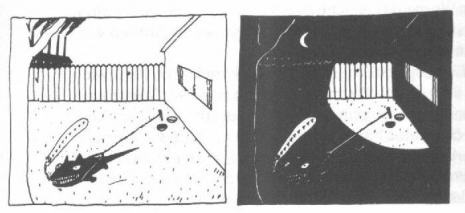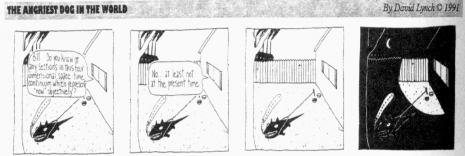
It was hiding in plain sight, and yet it was almost designed not to be noticed at all. For several years from the mid-1980s to the early 1990s, an experimental four-panel comic strip conceived and written by David Lynch ran in a handful of alt-weeklies under the title “The Angriest Dog in the World.” If you were the type of person who might have been flipping through the Los Angeles Reader or the New York Press or Creative Loafing or the Baltimore City Paper around 1987, you surely remember the peculiarly unfunny strip with the never-changing image of a tiny, spermatozoa-esque pooch straining at his lead in which the deadpan resolution was almost always a transitional nighttime image of the same godforsaken yard.
It is said that Lynch came up with the idea for the strip during the long gestation period for Eraserhead in the early to mid-1970s, but it was only after the prominent releases of The Elephant Man and Dune that Lynch was able to convince anyone to run the strip. James Vowell, founding editor of the L.A. Reader, was the first publisher to bite. Vowell told SPIN in 1990 that Lynch drew the template for the strip a single time and sent it on, and after that it was the task of David Hwang, the alt-weekly’s art director, to receive the dialogue for each new installment from Lynch himself or Lynch’s assistant Debbie Trutnik, and draw the new dialogue on a piece of wax paper that was then superimposed over the strip’s template. (It’s noticeable that the handwriting in the captions changes over time, but I don’t know if that represents the input of different people or what.)
“The Angriest Dog in the World” had a memorable intro text, which was presented at the start of every installment:
The dog who is so angry he cannot move. He cannot eat. He cannot sleep. He can just barely growl. Bound so tightly with tension and anger, he approaches the state of rigor mortis.
The dog itself never did anything but growl, while whatever “action” there could be said to occur emanated from inside the house. Speech bubbles indicate the existence of human beings named “Bill,” “Sylvia,” “Pete,” who were apparently fond of trading street jokes creaky enough to make Henny Youngman himself die of embarrassment. A typical example runs:
Person A: Bill…. Monopoly jam?
Bill: What the hell is that?
Person A: They say it’s a game preserve.
Other times the strip veered into non sequitur, with pronouncements such as “It must be clear even to the non-mathematician that the things in this world just don’t add up to beans.” The introduction of fiery panels apparently ignited by an unseen hand on the rightward side of the strip did liven things up in a suitably apocalyptic register.

The evidence on the matter of the strip’s popularity was decidedly mixed. SPIN stated that in a 1989 survey, 20% of New York Press readers selected “The Angriest Dog in the World” as their least favorite feature, but when the Baltimore City Paper asked its readers what they thought a few years earlier, the outcome was 5 to 1 in favor of keeping it. In the mid-1980s an enterprising parodist named Jeff Murray aptly skewered Lynch as “The Laziest Cartoonist in the World.”
In their volume on the director, Colin Odell and Michelle Le Blanc described “The Angriest Dog in the World” as “a masterpiece of minimalist cartoon writing,” nailing its appeal thus:
The simple, black and white, harsh style of the strip, with its nervous, edgy lines and picket fence suburbia turned into a Dadaist battlefield, would later reflect the look of his animated series Dumbland.
Oh right: if you haven’t heard about Dumbland, you really owe yourself a peek.
Lynch has always had a knack for writing against type, if you will: his “dramas” are consistently crammed with amusing and odd bits of business, and here, in what is ostensibly a vehicle for mirth, what you mainly get are stale punchlines and what must be apprehended as a considerable quotient of pain, no matter how ironically presented.
The meditating master of misdirection is notoriously hard to pin down on any subject, but David Breskin managed to get a straight answer out of the director in Inner Views, his charming book of interviews with famous directors:
Breskin: And what makes you the angriest dog in the world?
Lynch: Well, I had tremendous anger. And I think when I began meditating, one of the first things that left was a great chunk of that. I don’t know how it went away, it just evaporated.
Breskin: What was the anger like? Where did he come from?
Lynch: I don’t know where it came from. It was directed at those near and dear. So I made life kind of miserable for people around me, at certain times. It was really a bummer. Even though I knew I was doing it, there wasn’t much I could do about it when the thing came over me. So, anger––the memory of anger––is what does “The Angriest Dog.” Not the actual anger anymore. It’s sort of a bitter attitude toward life. I don’t know where my anger came from and I don’t know where it went, either.
The strips are difficult to find online, and those that are available are, for the most part, blurry and indistinct. To be honest, these self-consciously stupid strips are crying out to be collected in a book. Until that happens, we’ve presented a healthy collection below.
We’ll give the final word on the subject to Vowell, the strip’s very first patron, who once explained to Rob Medich of Premiere, “It’s just the same bad jokes. They’re really pretty dreadful. You can quote me. But they’re still fun. I think sometimes he tests to see what it would take for us to throw him out of the paper.”

















Previously on Dangerous Minds:
‘Dumbland,’ David Lynch’s remarkable animated series, lives up to its name